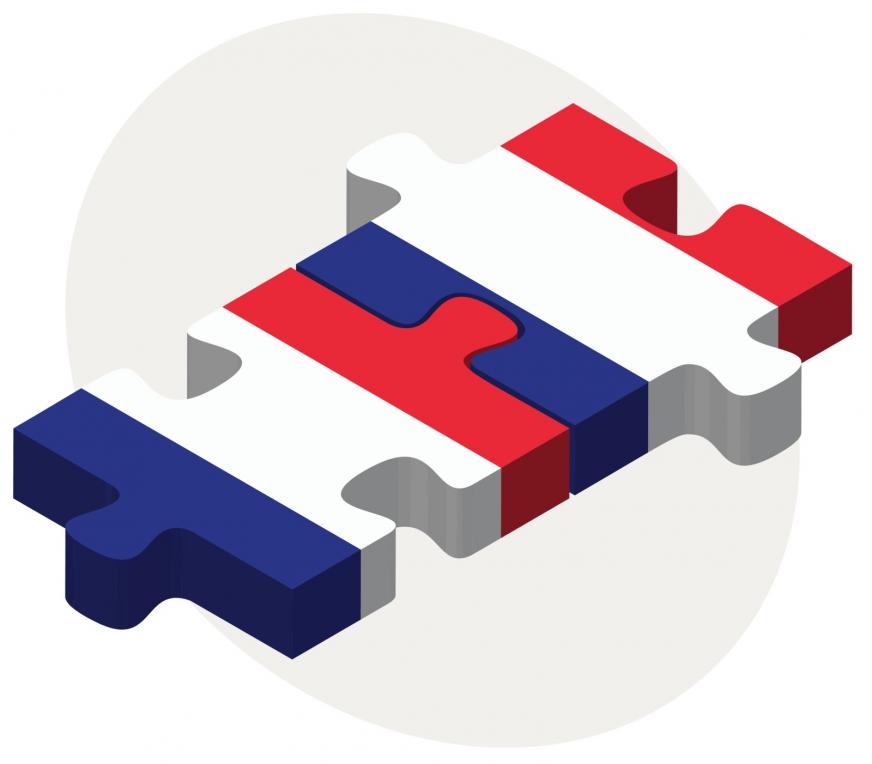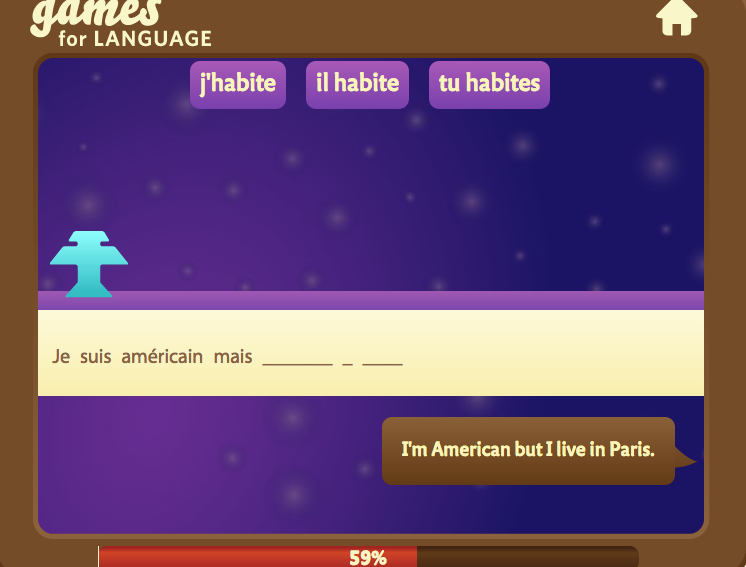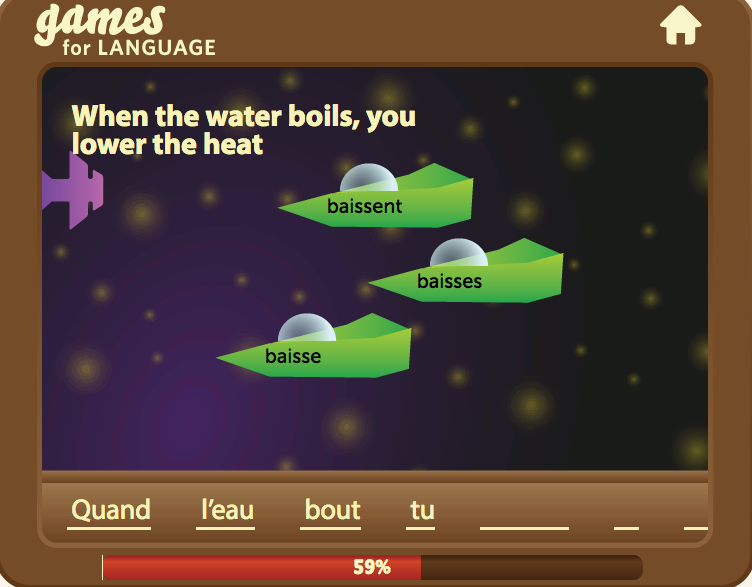Practice French Conjunctions with Language Games
 Conjunctions join words, groups of words, clauses, or sentences, and show how actions, events and ideas are connected. They are essential for conversations and are the staple of any speech or argument.
Conjunctions join words, groups of words, clauses, or sentences, and show how actions, events and ideas are connected. They are essential for conversations and are the staple of any speech or argument.
Memorizing French conjunctions individually is not that difficult, but using them correctly in sentences takes some practice. Most of them occur in our French 1 travel-story course, where you can practice them in various games.
French, like English, has two types of conjunctions: coordinating and subordinating.
French Coordinating Conjunctions
These join words or groups of words that are of equal value. The most commonly used French coordinating conjunctions are: et (and), ou (or), mais (but), ni...ni (neither...nor), car (because, as), donc (therefore, so).
Our Quick French Language Game, Basic French Conjunctions, will let you practice the most common ones. Click on the link or one of the images below.
 et (and)
et (and)
• De rien, et bon voyage. (You're welcome and have a good trip.)
• Il est fatigué et dort un peu. (He is tired and sleeps a little.)
ou (or)
• Vous pouvez prendre les bus 3, 4 ou 6. (You can take the buses 3, 4 or 6.)
• Aller simple ou aller-retour? (One-way or return trip?)
(And don't confuse the conjunction “ou” with the acverb “où”, which is pronounced the same, but has a grave accent on the “u” and means “where” and in some cases “when.”)
mais (but)
• Oui, mais c'est mon premier voyage en France. (Yes, but it's my first trip to France.)
• Je ne suis pas certain, mais je crois que c’est ça. (I'm not sure, but I think that's it.)
ni (neither... nor...)
• Je n'aime ni la glace ni le chocolat. (I like neither ice cream nor chocolate.)
• Ni moi ni la police ne pouvions te joindre. (Neither I nor the police could reach you.)
car (because, for, as)
• Je suis inquiet car elle n'est pas encore rentré. (I'm worried because she isn't back yet.)
• Je reste à la maison car je suis malade. (I'm staying at home because I'm sick.)
donc (therefore, so)
• Je pense, donc je suis. (I think, therefore I am.)
• Je n'ai rien vu, donc je ne sais pas. (I didn't see anything, so I don't know.)
French Subordinating Conjunctions
These connect a dependent clause to a main clause, showing a relationship of time, place, or cause and effect between them. When using a subordinating conjunction, you'll have to think about which tense or mood of the verb to use.
The most commonly used French subordinating conjunctions are: quand (when), si (if), que (that), comme (as, since), quoique (although)
 quand (when)
quand (when)
• Quand je me suis réveillé, il était midi. (When I woke up it was noon.)
• Julie m'a fait visiter la ville, il ne faisait pas beau. (When Julie showed me around town, the weather wasn't nice.)
si (if)
• Tu peux le prendre si tu veux. (You can take it if you want.)
• S'il fait beau, on ira se promener. (If the weather's nice, we'll go for a walk.)
que (that)
• Je crois que c’est ça. (I think that's it.)
• Je suis content que tu nous rendes visite. (I'm glad that you're visiting us.)
• Il faut que tu reviennes bientôt. (You have to come back soon.)
• Dommage que je parte demain. (Too bad that I'm leaving tomorrow.)
Note: With expressions such as “je suis content(e) que”, “il faut que”, “dommage que”, you would use the subjunctive mood for the verb. This will be the subject of another post.
comme (as, since)
• Elle est partie comme j'arrivais. (She left as I arrived.)
• Comme il arrive demain, il faut préparer une chambre. (Since he's arriving tomorrow, we have to get a room ready.)
quoique (even though, although)
• Je veux l'acheter quoique ce soit très cher. (I want to buy it even though it's very expensive.)
• Quoiqu'il soit pauvre, il est très généreux. (Even though he's poor, he's very generous.)
Conjunctive Phrases
French also has a large number of phrases that function as conjunctions. They usually end with “... que” and mostly require the subjunctive. Here are just a couple of examples:
avant que (before)
• Il n’attend pas longtemps avant que le train arrive. (He doesn't wait long before the train arrives.)
• Avant que la réunion ne commence, le Directeur veut vous parler. (Before the meeting starts, the manager wants to speak with you.)
parce que (because)
• D’accord, mais c’est bien parce que c’est vous. (All right, but only because it's you.)
• Je suis en retard parce que mon réveil n'a pas sonné. (I'm late because my alarm didn't go off.)
jusqu’à ce que (until)
• Juste le premier chapitre, jusqu’à ce que je me souvenais. (Only the first chapter, until I remembered.)
• Reste ici, jusqu'à ce que je revienne te chercher. (Stay here until I come back to get you.)
Maybe next time you read a French article or listen to a French podcast, you'll pay special attention to the conjunctions. Reading and listening to French will help to internalize how conjunctions work and how they are used by native speakers.
Our easy language games will give you a good start by teaching you the individual basic conjunctions and how to build short sentences with them.
Bio: Ulrike Rettig is the co-founder of GamesforLanguage.com. She is a lifelong language learner, growing up in Austria, the Netherlands, and Canada. You can follow her on Facebook, Twitter and Instagram, and leave any comments with contact.
